The UK government announced that it will introduce a carbon border adjustment mechanism (CBAM) by 2027, establishing a carbon tax on imported goods targeted at a series of key emissions-intensive industries, aimed at equalizing the carbon price paid by UK producers with those outside the UK, and avoiding “carbon leakage,” or shifting of production of carbon-intensive goods to jurisdictions with less stringent emissions reduction policies.
The CBAM will initially apply a carbon price to imported goods from sectors including aluminum, cement, ceramics, fertilizers, glass, hydrogen, iron and steel.
In a statement announcing its plans to roll out the CBAM, the UK Treasury said:
“Decarbonising UK industry forms an important part of delivering the energy transformation needed to achieve net zero. But these efforts will not succeed if decarbonisation in the UK simply leads to higher emissions abroad.”
The new carbon tax follows a review by the government launched earlier this year on potential measures aimed at mitigating carbon leakage, with UK producers in several emissions-intensive sectors subject to the country’s Emissions Trading Scheme (ETS), one of the key tools used by the UK to decarbonize industry.
Launched in 2021 to replace the UK’s participation in the EU’s Emissions Trading System, the UK ETS sets a limit on greenhouse gas (GHG) emissions for key GHG intensive sectors, which decreases over time to motivate companies to lower emissions in line with sector climate goals, with companies obtaining allowances for every tonne of emissions the produce each year, and companies that are successful in reducing emissions below the cap limit able to sell emissions allowances on the secondary market to other industry participants.
According to the consultation, however, 85% of respondents cited carbon leakage, in which production moves to countries with less ambitious decarbonization policies or carbon prices, as a risk to their own decarbonization efforts and investments.
Under the new CBAM structure, importers of products from overseas countries with lower carbon prices will be charged a levy on the products, based on the amount of carbon emitted in the production of the imported goods, and the gap between the carbon price applied in the country in which the products were produced, and that paid by UK producers.
The EU recently also adopted a CBAM to equalize carbon prices on imports with its own ETS system.
The Treasury said that the design of the CBAM, including a precise list of products in the system’s scope, will continue to be subject to consultation in 2024, and that it will engage with trade partners and affected businesses in order to minimize the impact of the new system on trade.
Chancellor of the Exchequer Jeremy Hunt said:
“This levy will make sure carbon intensive products from overseas – like steel and ceramics – face a comparable carbon price to those produced in the UK, so that our decarbonisation efforts translate into reductions in global emissions.”

